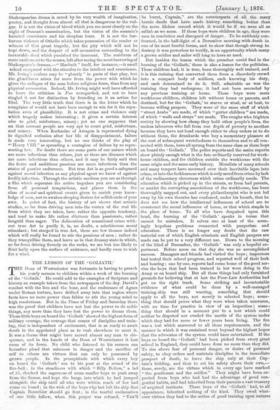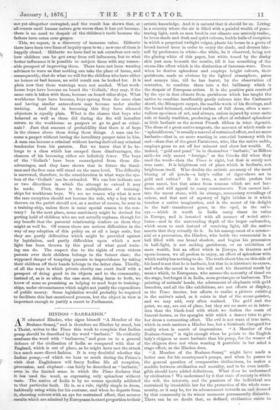THE LESSON OF THE ' GOLIATH.'
MIR Dean of Westminster was fortunate in having to preach his yearly sermon to children within a week of the burning of the ' Goliath.' He could add to the examples of Scripture and history an example taken from the newspapers of the day. David's combat with the lion and the bear, and the endurance of Agnes under Roman torture, have drifted away into that region where facts have no more power than fables to stir the young mind to high resolutions. But in the Times of Friday and Saturday there was the proof that children have not lost the power to do noble things, any more than they have lost the power to dream them. These little boys on board the 'Goliath 'showed the highest form of military courage, the courage that comes of discipline and train- ing, that is independent of excitement, that is as ready to await death in the appointed place as to rush elsewhere to meet it. It was a theme that might have moved almost any man to elo- quence, and in the hands of the Dean of Westminster it lost none of its force. No child who listened to his sermon can hereafter plead that calmness in danger and the sacrifice of self to others are virtues that can only be possessed by grown people. In the promptitude with which every boy on board the ' Goliath' ran to his post at the sound of the fire-bell ; iu the steadiness with which " Billy Bolton," a lad of 13, checked the eagerness of some smaller boys to push away from the flames, and kept the barge into which he had jumped alongside the ship until all who were within reach of her had come on board ; in the wish of the boys whp last left the ship that Captain Bourchier should go first ; in the tearful exclamation of one little fellow, when this prayer was refused, "You'll
be burnt, Captain," are the counterparts of all the many heroic deeds that have made history something better than the mere lifeless record which it would be if we were all as selfish as we seem. If these boys were children in age, they were men in resolution and disregard of danger. To be suddenly con- fronted, in the half-light of a December morning with death in one of its most fearful forms, and to show that though strong to destroy it was powerless to terrify, is an opportunity which many a grown soldier and sailor will long to have so used.
But besides the lesson which the preacher could find in the burning of the Goliath,' there is also a lesson for the politician. These children had, it is true, been thoroughly well trained, and it is this training that converted them from a disorderly crowd into a compact body of soldiers, each knowing his duty, and each determined to do it. Still, admirable as was the training they had undergone, it had not been seconded by any previous training at home. These boys were mere workhouse children, children left without home or parents, and destined, but for the ' Goliath,' to starve or steal, or at best, to become willing paupers. They were of the same stuff of which "street Arabs" are made, of which "gutter children" are made, of which "waifs and strays" are made. The roughs who frighten society by showing how cheap they hold other people's lives, the useless labourers who fall from one depth of poverty to another because they have not head enough either to obey orders or to do without them, the drunkards who buy a momentary pleasure at the cost of subsequent wretchedness to themselves and to all con- nected with them, have all sprung from the same class as these boys on board the Goliath.' The police reports and the assize reports show plainly enough what is the fate ordinarily reserved for work- house children, and for children outside the workhouse with the same origin and the same early history. Moralists of many schools and many tempers have mourned over their inevitable lapse into crime, or into the fecklessness which is only saved from crime by lack of the rudimentary cleverness which crime ordinarily needs. The education which is picked up in the streets, or from bad parents, or amidst the corrupting associations of the workhouse, has been thoroughly mapped out, and every philanthropist who is not led away by his own theories has confessed, under his breath, that he does not see how the intellectual influences of school are to counteract the moral influences of home, or that which stands in the place of home. To all who have despaired upon this head, the burning of the ' Goliath' speaks in terms that cannot be mistaken. It solves one at least of the seem- ingly hopeless problems connected with pauperism and education. There is no longer any doubt that the raw material out of which English criminals and English paupers are made can be put to a very different use. Down to the morning of the 22nd of December, the Goliath' was only a hopeful ex- periment. Before noon on that day she was an accomplished success. Managers and friends had visited the boys ; inspectors had tested their school progress, and reported well of their look and bearing ; one by one, reports had come home of the good ser- vice the boys that had been trained in her were doing in the Army or on board ship. But all these things had only furnished grounds for believing that at last the Poor-Law Authorities had got on the right track. Some striking and incontestable evidence of what could be done by a well-managed training-ship was still wanting, something that should apply to all the boys, not merely to selected boys ; some- thing that should prove what they were when taken unawares, with no time for practice in view of an inspection ; some- thing that should in a moment put to a test -which could neither be disputed nor evaded the merits of the system under which they had for more or fewer years been living. The fire was a test which answered to all these requirements, and the manner in which it was sustained went beyond the highest hopes that the advocates of the system could have entertained. If the boys on board the ' Goliath' had been picked from every great school in England, they could have done no more than they did. To rise above fear of personal danger, or desire of personal safety, to obey orders and maintain discipline in the immediate prospect of death, to leave the ship only at their Cap- tain's biddieg, and then to set his safety above their own,— these, surely, are the virtues which in every age have marked "the gentleman and the soldier." They might have been ex- pected from boys who had had the advantage of good con- genital habits, and had inherited from their parents a vast treasury of acquired instincts. These boys of the ' Goliath' had, to all appearance, inherited nothing of the kind. They owed what- ever virtues they had to the action of good training upon natures
not yet altogether corrupted, and the result has shown that, at all events until human nature gets worse than it has yet become, there is no need to despair of the children's teeth because the fathers have eaten sour grapes.
This, we repeat, is a discovery of immense value. Hitherto there have been two lines of inquiry open to us ; now one of them is happily closed. Hitherto we have had to ask ourselves not only how children can be got away from evil influences, but to what better influences it is possible to subject them with any reason- able prospect of improving them. There have not been wanting advisers to warn us that nothing can take the place of home, and consequently, that do what we will for the children who have either no homes or bad homes, no solid result can be looked for. It is plain now that these warnings were not needed. What work- house boys have become on board the ' Goliath,' they may, if the same care is taken with them, become on board other ships. What workhouse boys have become, boys sprung from the same class and having similar antecedents may become under similar training. And that in becoming this they have silenced objectors is equally plain. What is the chance that boys who behaved as well as these did during the fire will hereafter return to the workhouse as paupers or go to gaol as crimi- nals ? Just that amount of probablility that there is of boys in the classes above them doing these things. A man can be- come a pauper without having the hereditary pauper taint in him. A man can become a criminal without having derived any criminal tendencies from his parents. But we know that if he be- longs to a class which has escaped these disadvantages, the chances of his becoming either are infinitely fewer. The boys of the Goliath' have been emancipated from these dis- advantages, and they have shown that in future the freed- man and the free man will stand on the same level. The difficulty is narrowed, therefore, to the consideration in what ways the sys- tem of the ' Goliath' can be extended. We can but indicate one or two directions in which the attempt to extend it may be made. First, there is the multiplication of training- ships for workhouse boys. We see no reason why what is now the rare exception should not become the rule, why a boy who is thrown on the parish should not, as a matter of course, be sent to a training-ship, unless there is some special reason to the con- trary? In the next place, some machinery might be devised for getting hold of children who are not actually orphans, though for any benefit that the parental relationship confers on them they might as well be. Of course there are serious difficulties in the way of any adoption of this policy on at all a large scale, but they are partly difficulties which might be provided against by legislation, and partly difficulties upon which a new light has been thrown by this proof of what good train- ing can do. The respect due to the rights of even vicious parents over their children belongs to the former class ; the supposed danger of tempting parents to improvidence by taking their children off their hands belongs to the latter class. Thirdly, of all the ways in which private charity can exert itself with a prospect of doing good to its objects and to the community, instead of, as is so often the case now, doing harm to both, we know of none so promising as helping to send boys to training- ships, under circumstances which might not justify the expenditure of public money. Some legislation would probably be required to facilitate this last-mentioned process, but the object in view is important enough to justify a resort to Parliament.











































 Previous page
Previous page